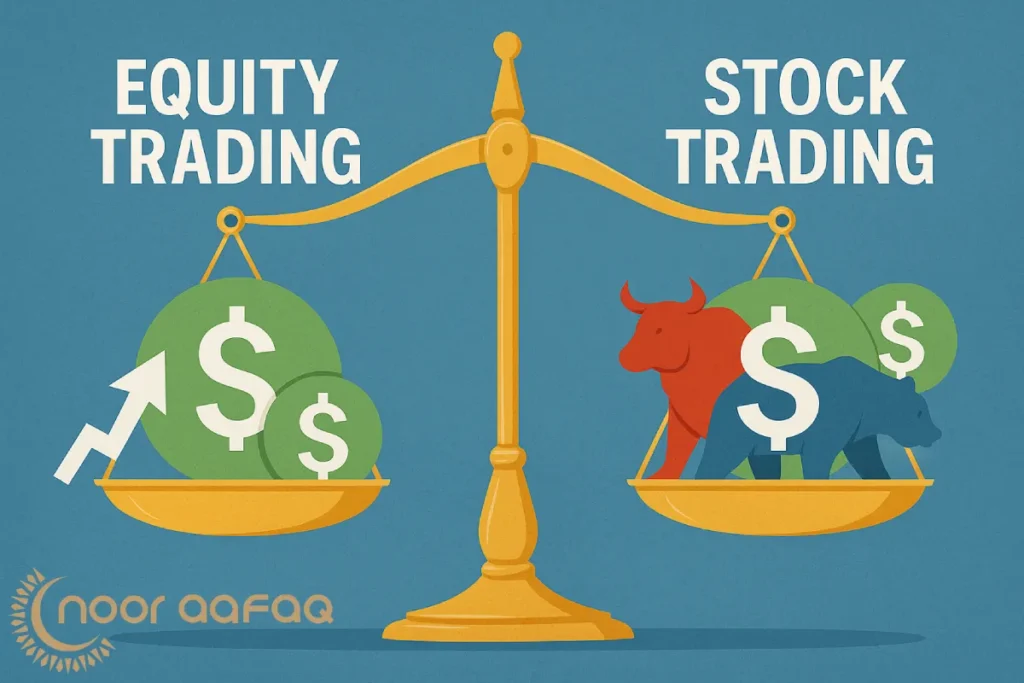Let’s be honest, the average person doesn’t typically begin their day thinking about market terms or equity strategies, and when it comes to investing, most people want to grow their money without getting lost in confusing terms. And here’s where things like equity trading and stock trading come up. At first glance, they sound the same. But no, they’re not.
Understanding the difference between equity trading vs stock trading isn’t just good to know, it’s actually a pretty big deal. Why? Because how you invest your money depends on which path you pick. Each comes with its own pace, purpose, and payoff.
So, if you’re trying to build a game plan that fits you, not just your bank account, but your lifestyle, figuring out this equity trading vs stock trading puzzle is a good place to start
If you’re unsure where to start or just want a clearer view, there are some great free breakdowns and side-by-side comparisons over on noor aafaq that lay it out simply, no finance degree required.
What Is Equity Trading?
Equity trading is basically about buying pieces of companies, but not just limited to individual stocks. We’re talking about mutual funds, ETFs, preferred shares, and sometimes even private equity deals. In short, it’s the big picture.
The goal here isn’t to make a quick buck. It’s more about building a portfolio that grows over time. People who trade equities are usually thinking years ahead. They’re looking for long-term gains, consistent dividends, and exposure to broader markets.
And if this sounds more like your style, exploring ETF guides or long-term strategy tips, like the ones shared on Noora Aafag , could give you a helpful edge early on.
You can think of equity trading as the strategic, slow-cooker method of investing. Not flashy. But reliable.
What Is Stock Trading?
Now, stock trading is more specific. It’s about buying and selling shares of public companies—think Apple, Tesla, or Google. And yeah, it’s usually a much faster game.
Many stock traders jump in and out of positions daily or weekly, hoping to cash in on price swings, news updates, or trends. It requires active involvement, quick decisions, and a strong tolerance for risk.
In short, stock trading is the high-speed rollercoaster in the investment theme park. Buckle up!
Differences Between Equity and Stock Trading
So, what’s the deal with equity trading vs stock trading? Let’s unpack the main differences.

Scope and Instruments
Stock trading is just one piece of the equity puzzle. It focuses on public company shares. That’s it. Equity trading, though, includes way more ETFs, mutual funds, private equity and etc.
If stock trading is like playing one position in a sport, equity trading is being the whole team coach. Bigger scope, more moving parts.
Strategy and Objectives
Stock traders aim for short-term profits. They’re watching charts, reacting to news, and riding trends. Equity traders? They’re building for the long haul. Their strategy is usually about slow, steady growth and diversification.
One’s quick and tactical. The other is patient and thoughtful.
Depending on your personality and goals, either path could work. You can even test out both approaches in a demo environment; there’s a step-by-step walkthrough for this on nooraafag if you’re curious to see what fits best before going all-in.
Risk Levels
Stock trading tends to carry more risk. One bad earnings report and boom! your stock tanks. Equity trading often comes with built-in risk management thanks to diversification. But don’t get too cozy, some equity investments (like options) can still be risky.
So yeah, both have risk. Just different flavors of it.
Platforms and Access
Both styles are now super accessible thanks to tech. Stock traders rely on platforms with lightning-fast execution and up-to-the-minute data. Equity platforms? They’re more about research tools, long-term performance tracking, and access to broader instruments.
Plenty of apps do both. But your focus matters.
Type of Traders
Stock traders love the action. They’re often day traders or swing traders who thrive on volatility. Equity traders range from everyday folks using robo-advisors to professionals managing millions.
It’s not about which is better, it’s about which fits your vibe and lifestyle.

Advantages and Disadvantages of Equity Trading
Equity trading can feel safer and more “grown-up,” especially if you’re not glued to the markets 24/7. But it’s not all sunshine. Here’s a quick look:
advantages:
• Broader diversification (fewer eggs in one basket)
• Long-term focus = less emotional decision-making
• Income via dividends
• Often less stressful day-to-day
• Fits passive investment strategies
disadvantages:
• Some tools (like private equity) are complex
• Slower returns, so patience is key
• Sometimes higher fees (management or fund costs)
• Might need more upfront capital
Advantages and Disadvantages of Stock Trading
Fast. Flexible. And let’s be honest, a bit addictive for some. But with the thrill comes risk.
advantages:
• Quick gains possible (hello, momentum!)
• Full control of your portfolio
• Low barrier to entry (even with $10)
• Plenty of styles to try (day trading, swing, etc.)
disadvantages:
• Highly volatile
• Short-term gains = higher taxes
• Easy to make emotional or impulsive trades
• Not much diversification

Which One Should You Choose?
Well… it depends. No one-size-fits-all here.
If you’re into quick decisions, enjoy tracking news and charts, and don’t mind the stress, stock trading might be for you. If you’re more about setting it, forgetting it, and watching your investments grow over time, then equity trading’s probably your jam.
And you don’t have to pick just one. Many smart investors do both. They use stock trading for short-term opportunities and equity trading for long-term stability.
Mix and match. Just make sure it matches you.
Common Misconceptions Between Equity and Stock Trading
Let’s bust a few myths:
• “They’re the same thing.” Not quite. Stock trading is part of equity trading, but equity covers more ground.
• “Equity trading is for pros only.” No. Anyone with a phone and a plan can start.
• “Stock trading is a get-rich-quick move.” It can also be a lose-money-fast move.
• “Equity trading is boring.” Actually, it’s less stressful—and smarter for most people.
• “You have to pick one.” Not true. Mixing strategies is common and often wise.
Conclusion
At the end of the day, equity trading vs stock trading isn’t a battle, it’s a choice. A personal one.
Do you want speed or strategy? Excitement or endurance? Or maybe a bit of both?
Whatever you choose, just make sure it lines up with your goals, your lifestyle, and how much risk you’re cool with. And remember, you’re allowed to change your approach as you grow. That’s what smart investors do.
FAQ
1. Is equity trading safer than stock trading?
Equity trading is often less risky due to diversification, but no investment is completely risk-free.
2. Should beginners start with equity or stock trading?
Beginners usually find equity trading easier and more passive, while stock trading requires more active management.
3. Do I need a lot of money to start equity or stock trading?
No, thanks to fractional shares and low-fee funds, you can start with small amounts in both.
4. Are taxes different between equity and stock trading?
Yes, long-term equity investments often get better tax treatment than frequent stock trades.













